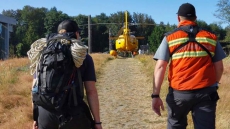VANCOUVER — Two orphaned black bears whose lives were spared when a conservation officer refused to kill them are being prepared for release as early as mid-June after nearly a year of rehabilitation at a Vancouver Island facility.
Julie Mackey, manager at the North Island Wildlife Recovery Centre in the community of Errington, said Jordan and Athena will be outfitted with GPS collars to track their movements once they're set free. The release date will be determined by the Environment Ministry.
The cubs' mother was killed by a conservation officer last July for twice raiding a freezer at a Port Hardy-area mobile home, and the ministry ordered the cubs destroyed after they were reported to be eating garbage.
Bryce Casavant defied orders to euthanize the bears and they were instead taken to a shelter. He was suspended from his job for a month, sparking a public outcry, and eventually transferred to a different job in the Forests Ministry.
The cubs are now about 15 month old, Mackey said, adding they are thriving in the company of six other bears.
Jordan and Athena's post-release monitoring via GPS collars, a first for the shelter, was part of an agreement with the Environment Ministry when the bears started rehabilitation, said Mackey.
She said the shelter will pay for the collars, at a cost of at least $2,500 each, plus fees for data collection.
"We stand to learn everything from their movement patterns, home-range size, length of hibernation and of any mortality that occurs during the time the collars are on."
Mackey said the collars will provide daily data and can be preset to fall off at a certain time so the bears don't need to be recaptured to retrieve the collars.
Angelika Langen, who co-founded the Northern Lights Wildlife Shelter in Smithers about 26 years ago, said her facility has so far collared three black bears and has private funding to buy collars for two bears that will be released in the coming weeks.
Northern Lights is part of the world's only pilot project that involved collaring 18 grizzly bears in 2007, Langen said.
However, long-term data for the ongoing project has been difficult to retrieve because while one of the growing bears kept a collar on for a year, the others ripped the restrictive pieces off much earlier, Langen said.
"They have a fall-off mechanism where they come off automatically and a piece that can be worked off if the bear started growing rapidly."
The shelter, which is dependent on private donations, has so far been unable to recollar the grizzlies in part because of the cost, which can be as high as $6,000 per collar, Langen said, adding she's not interested in government funding.
"You need a helicopter, you need to find them, you need to tranquilize them. A lot of things have to come together so it costs a lot of money to do those long-term projects and we just haven't been able to do that."
Thorough data about bears in their natural environment is available only through collars equipped with GPS and sometimes VHS as well, Langen said.
"What we used to keep getting thrown at us by the government biologists is that the animals don't survive, that we just put them out there and they starve to death," she said of the bears the facility has rehabilitated.
The government requires collars for rehabilitated bears if there are any concerns that animals, such as Jordan and Athena, may return to their old behaviour close to humans, she said.
Her shelter currently has 11 cubs, its highest number ever, and eight older bears waiting to return to their natural homes in the coming weeks, she said.

They will soon be roaming free around areas where they were captured before their mothers were killed or they were found wandering alone, Langen said.
The centre has released over 350 bears, and none had ever become "garbage bears" but two animals ended up in trouble last November.
The shelter had a mystery on its hands when a male and female bear it released four months earlier went looking for food at a home in the Kispiox Valley, in the northern Interior.
"We released seven bears into that area and only two got into trouble and it didn't make any sense at all," Langen said of the bears that were shot by a conservation officer.
The shelter ear tags bears, tattoos their lips and implants microchips during rehabilitation and identified the dead animals through those markings.
Langen said she spoke to the residents of a home, suspecting that the post-release problem may have involved human behaviour a year earlier before the bears were captured.
"I said, 'You need to be honest with us.' They finally told us they'd fed the bears dog food."
The bears were just responding to what they'd learned a year earlier through human behaviour, she said.
"It's not like they were starving. They just remembered that was a food place just like they would remember a place where they would find fish or they would find berries.
"It was heartbreaking. They had personalities. We knew them."
The shelter has since changed its policy and no longer releases bears in areas where they may have become habituated to food in garbage or directly from humans.


